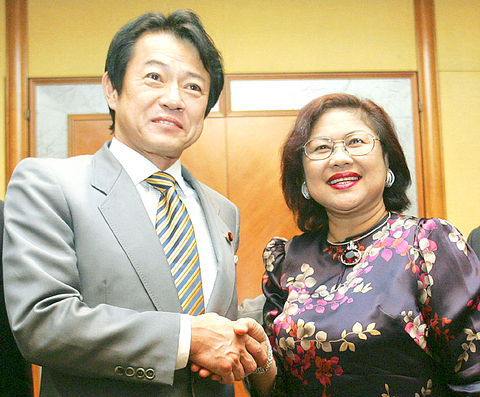Malaysia and Japan yesterday agreed to set up a free trade area (FTA) as part of a comprehensive economic relationship after resolving the last remaining differences in emergency, high-level talks.
"We have now finalized everything," International Trade and Industry Minister Rafidah Aziz told reporters after talks with Japanese Trade Minister Shoichi Nakagawa who arrived earlier yesterday for last-ditch efforts to salvage deadlocked negotiations on a planned free trade area.
"It will be a comprehensive economic framework agreement covering all the areas that we feel we would like to cover," Rafidah said.

PHOTO: AP
Talks between Japan and Malaysia began in Kuala Lumpur on Tuesday but had failed to produce a consensus on tariffs for industrial products, especially in the sensitive auto sector and steel industries of Malaysia, which Japan says is excessively protectionist.
"I have been saying that it is the final stretch that is the most difficult," Nakagawa said. The "trust and confidence" between the two countries had led to this "win-win relationship."
secret compromises
He and Rafidah refused to divulge the details of the compromises made in the auto and steel tariff structures with Nakagawa describing it as "a national secret."
Rafidah said that the comprehensive economic relationship will contain elements of the free trade area, which will be formally launched in December.
"What we have decided today will become the basis for an agreement in principle" that will be announced when Malaysian Prime Minister Abdullah Ahmad Badawi visits Tokyo on May 25-26 for a bilateral visit.
"It covers all areas -- goods, services, even agriculture and economic cooperation," she said.
Since launching the FTA talks in January last year, the two countries have reached a basic accord on agricultural and marine products. But outstanding issues remain, including Malaysia's tentative pledge to fully eliminate tariffs on imported vehicles by 2015. Japan wants an earlier deadline.
Malaysia imposes high import and excise duties on imported cars to protect its national Proton and Perodua cars from competition. The two carmakers jointly control 74 percent of the auto market in Malaysia, Southeast Asia's biggest passenger car market. Tariffs have recently been lowered for cars produced in Southeast Asian countries but other countries still face high barriers.
Japan also wants Malaysia to abolish tariffs on steel products used for vehicles and household appliances. It quoted unidentified Japanese government sources as saying that Malaysia is considering an immediate removal of tariffs for some car models that do not compete with Proton and Perodua.
Tariff variations
Rafidah said the FTA will contain some "early harvest programs," meaning a list of goods on which the tariff abolition and reduction will come into force immediately after the deal is signed in December. Other items will see the benefits of the FTA gradually.
"The mechanism for tariff cutting, tariff abolishment in terms of FTA will start as and when it is scheduled to start."
"Both sides are very happy ... As of now it is done. We are just going to shake hands afterward," she said.

US President Donald Trump yesterday announced sweeping "reciprocal tariffs" on US trading partners, including a 32 percent tax on goods from Taiwan that is set to take effect on Wednesday. At a Rose Garden event, Trump declared a 10 percent baseline tax on imports from all countries, with the White House saying it would take effect on Saturday. Countries with larger trade surpluses with the US would face higher duties beginning on Wednesday, including Taiwan (32 percent), China (34 percent), Japan (24 percent), South Korea (25 percent), Vietnam (46 percent) and Thailand (36 percent). Canada and Mexico, the two largest US trading

AIR SUPPORT: The Ministry of National Defense thanked the US for the delivery, adding that it was an indicator of the White House’s commitment to the Taiwan Relations Act Deputy Minister of National Defense Po Horng-huei (柏鴻輝) and Representative to the US Alexander Yui on Friday attended a delivery ceremony for the first of Taiwan’s long-awaited 66 F-16C/D Block 70 jets at a Lockheed Martin Corp factory in Greenville, South Carolina. “We are so proud to be the global home of the F-16 and to support Taiwan’s air defense capabilities,” US Representative William Timmons wrote on X, alongside a photograph of Taiwanese and US officials at the event. The F-16C/D Block 70 jets Taiwan ordered have the same capabilities as aircraft that had been upgraded to F-16Vs. The batch of Lockheed Martin

GRIDLOCK: The National Fire Agency’s Special Search and Rescue team is on standby to travel to the countries to help out with the rescue effort A powerful earthquake rocked Myanmar and neighboring Thailand yesterday, killing at least three people in Bangkok and burying dozens when a high-rise building under construction collapsed. Footage shared on social media from Myanmar’s second-largest city showed widespread destruction, raising fears that many were trapped under the rubble or killed. The magnitude 7.7 earthquake, with an epicenter near Mandalay in Myanmar, struck at midday and was followed by a strong magnitude 6.4 aftershock. The extent of death, injury and destruction — especially in Myanmar, which is embroiled in a civil war and where information is tightly controlled at the best of times —

China's military today said it began joint army, navy and rocket force exercises around Taiwan to "serve as a stern warning and powerful deterrent against Taiwanese independence," calling President William Lai (賴清德) a "parasite." The exercises come after Lai called Beijing a "foreign hostile force" last month. More than 10 Chinese military ships approached close to Taiwan's 24 nautical mile (44.4km) contiguous zone this morning and Taiwan sent its own warships to respond, two senior Taiwanese officials said. Taiwan has not yet detected any live fire by the Chinese military so far, one of the officials said. The drills took place after US Secretary